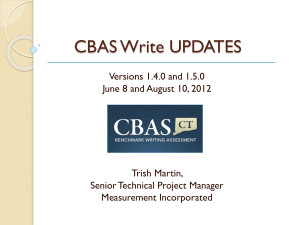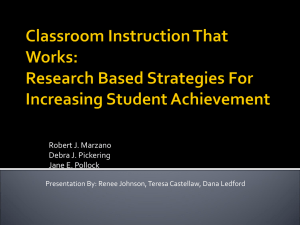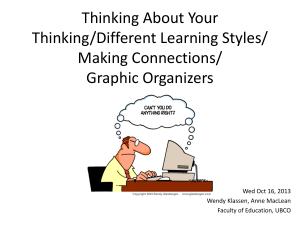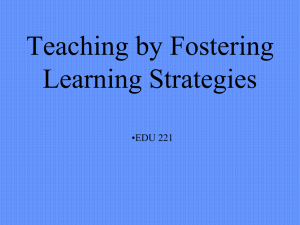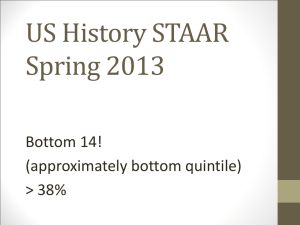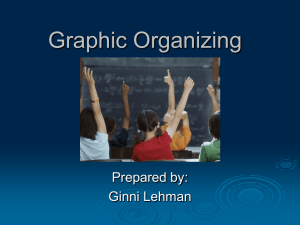Classroom Adaptations For English Language Learners
advertisement
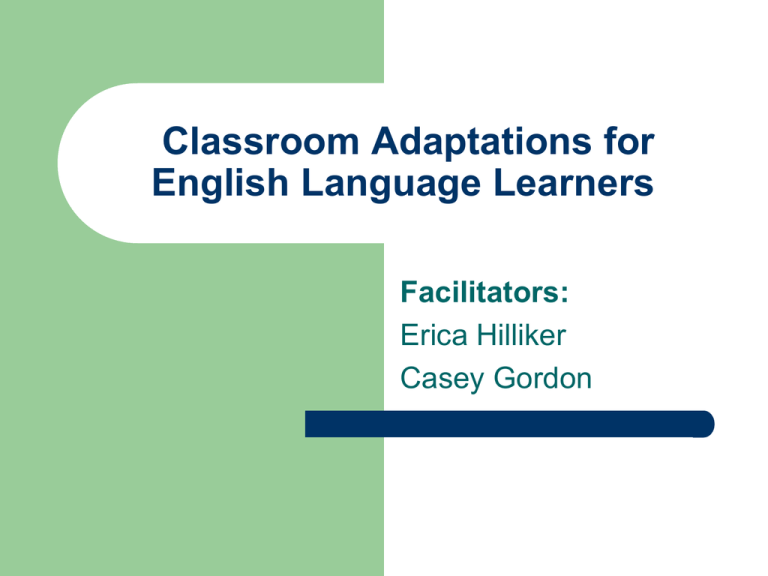
Classroom Adaptations for English Language Learners Facilitators: Erica Hilliker Casey Gordon Content and Language Objectives Content Objectives Participants will be able to… Identify and apply classroom adaptations for English Language Learners. Language Objectives Participants will be able to… Discuss methods for adapting classroom assessments for English Language Learners. Write test questions that are accessible to English Language Learners. Building Background What are some techniques you have used in your classroom that you have found helpful for teaching ELL students? Think-Write-Pair-Share Simplifying Text Reduce the grammatical complexity, while keeping all essential information. Shorten the sentences. Change the verb tenses to simple present, present progressive, or past tenses. Change the passive voice to the active voice. Delete unessential information-but retain key vocabulary! Simplified Text Example: Before: “Meanwhile, pioneer families were arriving in search of home sites and farmland. John had located his orchards on the routes he thought they’d be traveling. As he hoped, the settlers were eager to buy his young trees.” Johnny Appleseed A Tall Tale Retold and Illustrated by Steven Kellogg (1988) Morrow Junior Books / New York After: Pioneers, people moving to a new land, came to find new places for their homes and farms. John had planted his apple trees by the place where the pioneers would be going. The settlers, another name for the pioneers, were happy to buy John’s baby trees. Modifying Written Directions Leveled Study Guides Level 1 Level 2 The main character is The main character is _____. _________ (who). The story takes place _____ He lives ______(where). during ____. During the story The story happens at he ____________________. ________ (when). He has a problem with _____ He ________ in the story _________. At the end, he (what). _______solves the problem He has a problem with by __________________. ________ (why). At the end he ________ (how). Level 3 ___________________ is the main character in ________________by ______________. The story occurs at ______ during _____________. _______ has a conflict with _______________. However, the conflict is resolved when _______ ___________________. Graphic Organizers Graphic Organizers Graphic Organizers / Color Coding Graphic Organizers Graphic Organizers Graphic Organizers Note Taking Study Guides Note-taking Study Guides Teacher-prepared Designed with students’ needs in mind Provide short summaries and clues to the meaning of the material. Portions may be assigned to all students while others may be completed by designated groups of students. Example: Outline Notes for Social Studies Chapter 1: A Geographer’s World Section 1: Studying Geography I. What is Geography? ►The study of the , its , and the they create. ►Geography can be a: ▪ – geographers gather and observe data ▪ – deals with people and how they live II. Where do Geographers study? ► ►__________ ►________ Level – geographers can figure out why people live and work the way they do _____Level – defined by physical and human characteristics _______Level – geographers study the world to try to find relationships among people who live far apart III. What are the Geographers’ tools? ► – show what the world looks like (flat) ► – show what the world looks like (spherical) ► – above Earth ► – computers, tape recorders Highlighted Text Teachers preview the material to be read and highlight: – – – – Key Terms Concepts Summaries Other Important Information Example: Highlighted Text Continued Clozes Sentence Stems/Frames Sentence Stems/Frames Student-Generated Dictionaries Mnemonic Devices Cognates Cognates Assessment Adaptations that work Provide a word bank or specialized glossary containing relevant vocabulary. Let students use the word wall for assistance. Adapt the number of items to be completed. Adapt the amount of time for completing a task. Break the task into manageable chunks. Read directions and test questions aloud. Consider rephrasing for ELLs when appropriate. Assessment Adaptations that work Provide sample problems for each task type. Include pictures and graphic organizers used in lessons. Provide sentence stems or writing frames. Let students show mastery via verbal response, hands on activities, models/visual displays, sorting, etc. Actively involve students in assessment (i.e. selfassessment, co-creation of rubrics) Differentiated scoring- one score content knowledge and another based on language skills. Other Helpful Considerations Format of Test Spacing Use Printed Versions vs. Computer Testing if available Refine Unfamiliar Context Reduce Linguistic Complexity Eliminate extraneous information Avoid the following phrasing on tests: - “all of the following except” - “all of the above” - “none of the above” - “both A and B” - “do not, etc.” Strategies for Accommodating Existing Tests Multiple choice: eliminate one or more of the choices Discussion and essay: have ELLs label terms, draw and label diagrams and pictures Matching: reduce the number of matches required, give an equal number of possibilities in each column, and eliminate “trick” language matches Short-answer: accept one-word answers and phrases in place of complete sentences True/False: eliminate or clarify “tricky” language, reduce the number of questions Fill in the blank: provide two or three options (make the answer multiple choice) What is difficult about this? On the 12 days of Christmas, how many gifts did the ‘True Love’ receive? (Partridge in a Pear Tree, 2 Turtle Doves, 3 French Hens, 4 Calling Birds, 5 Golden Rings etc.) How can you show your work? Unfamiliar Context Frieda works at a concession stand selling hot dogs during a high school baseball game. If she sells 72 hot dogs during the game, how many hot dogs does she sell per inning? Refine Unfamiliar Context To prepare for a regional competition, Keith practiced on his skateboard 12 hours each week for 18 weeks. How many hours did Keith practice in all? Keith worked 12 hours each week for 18 weeks. How many hours did Keith work in all? Reduce Complexity: Verb Tense and “If” If bananas cost 35¢ per pound, how much will 4 pounds cost? Bananas cost 35¢ per pound. How much do 4 pounds of bananas cost? Visuals and Extraneous Information Cultural Contexts Make a Difference! Monica has four quarters, two dimes, and one nickel. How much money does she have? Li has 3 yuan, 8 jiao, and 4 mao. How many RMB does she have? Let’s Practice! Form groups of four. In your group, read over the following assessment designed for a 7th grade Language Arts classroom. Select one question to rewrite using some of the adaptations you have learned about today, and copy your new question onto a large piece of paper. Select a member from your group to report the changes you have made to the rest of your colleagues. Now it’s your turn! Select a partner who teaches the same content area or grade level as you. One at a time, share one of the assessments you will be using this year. Discuss adaptations you could use that might make the assessment more accessible to ELL students in your classroom. Be prepared to share the changes you have made with the rest of the group. Reflection What are some changes you made to your assessments? What are some observations you made while going through this process? Did we meet our objectives? Content and Language Objectives Content Objectives Participants will be able to… Identify and apply classroom adaptations for English Language Learners. Language Objectives Participants will be able to… Discuss methods for adapting classroom assessments for English Language Learners. Write test questions that are accessible to English Language Learners. 3-2-1 Workshop Evaluation List 3 things you learned today. List 2 things you want to try out. List 1 thing you still have a question about or need more help with.
